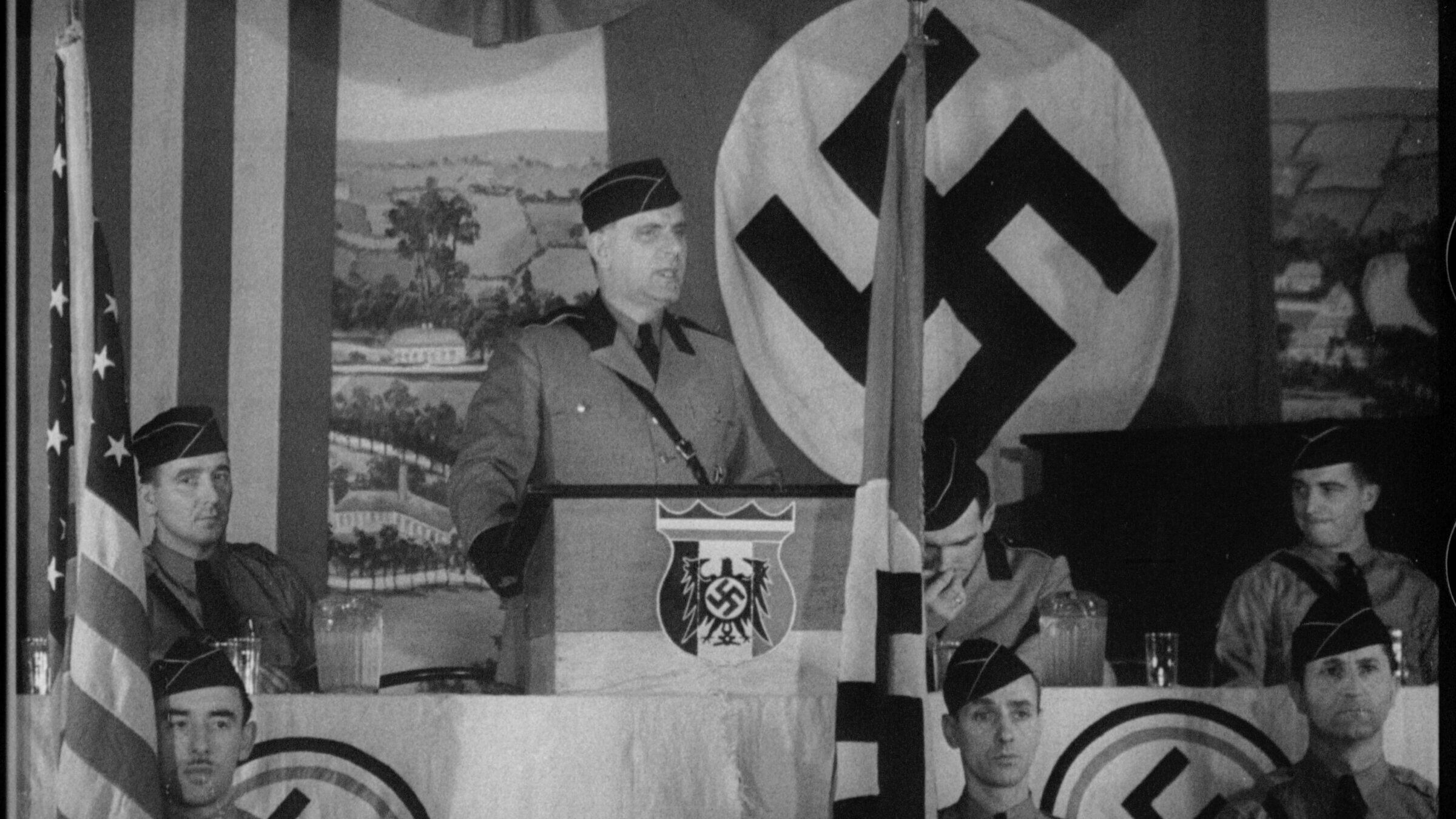Why America was an easy mark for Nazi ideas
‘Nazi Town, USA’ explores how Nazi organizations flourished in the years before World War II

Fritz Kuhn speaks at a German American Bund meeting, New York, 1938. Courtesy of National Archives
What does American fascism look like? This weekend, it took the form of a group of men in white balaclavas, members of the white nationalist group Patriot Front, marching on the World Trade Center in Manhattan and struggling to pass the turnstiles. But it wasn’t always quite so inept.
Peter Yost’s PBS documentary Nazi Town, USA, airing Jan. 23, draws our attention to a period in the 1930s when American citizens, rocked by the Depression and primed by decades of racist policy and eugenic ideas, cozied up to fifth columns like the German American Bund. It starts with sensational images from Bund summer camps — located throughout the country — where families gathered to picnic, practice archery and raise the American flag alongside the banner of Nazi Germany.
Using archival footage and an array of talking heads, Yost guides us through the stages of the Nazi seduction of America from the Third Reich-developed Friends of New Germany through to Fritz Kuhn’s Bund, whose major innovation was convincing Americans that heiling Hitler and George Washington in the same breath was a natural synthesis.
“We are decidedly not preaching un-Americanism or anything basically new,” Kuhn, a German immigrant who claimed to have been involved in Hitler’s Beer Hall Putsch, is heard saying in one speech. “We have an Asiatic exclusion act, Jim Crow laws and a complicated system of immigration quotas, differentiating even between the various white people, it has then always been very much American.”
Certainly this is true, even if some of the historians interviewed take pains to say that Americans in the years before World War II didn’t know Hitler’s end game. It’s an odd excuse given that it’s patently obvious they couldn’t predict the future, but also the fact that the Bund, like Father Coughlin’s Christian Front and myriad other organizations, made no secret of their feelings toward Communists, immigrants and, in particular, Jews. Would they have blanched reading the minutes of the Wannsee Conference? I suspect we may be giving these people a bit too much credit.
The history of the various fascist fronts. and the fascinating Jewish resistance against them, is complex, but Yost, whose interview subjects include USC’s Steven J. Ross and John Hopkins’ Leah Wright Rigueur, does an admirable job explaining the factors that led so many to embrace what we so often deem, incorrectly, to be antithetical to what America is.
Still, some subjects are treated with kid gloves. After the infamous 1939 rally at Madison Square Garden, the subject of consulting producer Marshall Curry’s Oscar-nominated A Night at the Garden, on which Yost assisted, the film explains how the Bund’s influence fell and the anti-interventionist America First Committee filled the void with Charles Lindbergh as its spokesperson.
Lindbergh is described as “flirting” with pro-Hitler sentiments and antisemitism, but no mention is made of his contemptible speech in Des Moines, where he accused Jews of pushing the country into war, or the fact that Reichstag President Hermann Goering pinned a Nazi medal to his chest in 1938.
The film also resists making clear connections to today, even as Donald Trump revived the “America First” slogan along with a long dormant mode of nativism. The one moment Yost suggests a clear parallel is in a clip of Benito Mussollini addressing Americans who are “working to make America great.”
By skirting current events and packaging this story as a warning from history, Yost’s film seems like a politically agnostic exercise. That approach has its merits, and may in fact be de rigueur for public broadcasting. One need not see the tiki torches in Charlottesville or rioters battering the Capitol to pick up on all the parallels, but by not being more direct, the documentary risks losing those who are most predisposed to the American strain of fascism.
Then again, those Americans probably aren’t watching PBS.




















